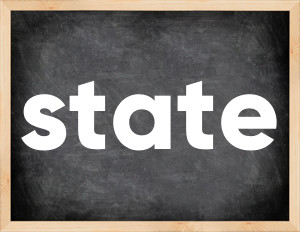 The English verb 'state' is pronounced as [steɪt].
The English verb 'state' is pronounced as [steɪt].
Related to:
regular verbs.
3 forms of verb state: Infinitive (state), Past Simple - (stated), Past Participle - (stated).
Here are the past tense forms of the verb state
👉 Forms of verb state in future and past simple and past participle.
❓ What is the past tense of state.
State: Past, Present, and Participle Forms
| Base Form | Past Simple | Past Participle |
|---|---|---|
| state [steɪt] |
stated [ˈsteɪtɪd] |
stated [ˈsteɪtɪd] |
What are the 2nd and 3rd forms of the verb state?
🎓 What are the past simple, future simple, present perfect, past perfect, and future perfect forms of the base form (infinitive) 'state'?
Learn the three forms of the English verb 'state'
- the first form (V1) is 'state' used in present simple and future simple tenses.
- the second form (V2) is 'stated' used in past simple tense.
- the third form (V3) is 'stated' used in present perfect and past perfect tenses.
What are the past tense and past participle of state?
The past tense and past participle of state are: state in past simple is stated, and past participle is stated.
What is the past tense of state?
The past tense of the verb "state" is "stated", and the past participle is "stated".
Verb Tenses
Past simple — state in past simple stated
(V2).
Future simple — state in future simple is state (will + V1).
Present Perfect — state in present perfect tense is
stated
(have/has + V3).
Past Perfect — state in past perfect tense is
stated
(had + V3).
state regular or irregular verb?
👉 Is 'state' a regular or irregular verb? The verb 'state' is regular verb.
Examples of Verb state in Sentences
- This paragraph states the obvious (Present Simple)
- Henry stated that these meetings are effective. (Past Simple)
- Our delegation has stated about our intent to join the Partnership (Present Perfect)
- Look, I'm just stating the facts (Present Continuous)
- So you want to state your employee's innocence? (Present Simple)
- I refuse to state where I've found these keys. (Present Simple)
- Your Honor, I want to state about my client's innocence (Present Simple)
- I hate to state the obvious, but this car is mine (Present Simple)
- I wasn't even given a chance to state my case (Past Simple)
- State your point clearly and concisely (Present Simple)